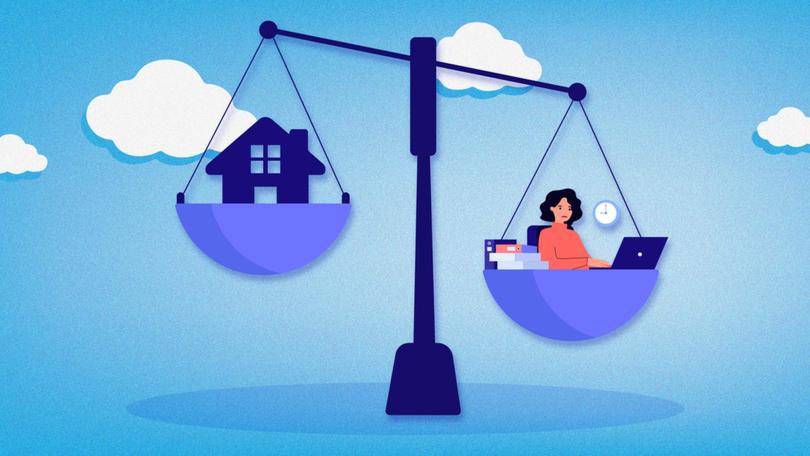GEMMA ACTON: Australia’s work-life balance ranks among the world’s worst
GEMMA ACTON: We might like to think of ourselves as a relaxed bunch, but our nation’s work-life balance actually ranks among the developed world’s worst.

“What is a weekend?”
The question, innocently uttered by the elderly matriarch Dowager Countess from the British historical drama series Downton Abbey, tickled audiences given many of us ordinary working folk live in continuous anticipation of the next weekend.
The concept of a world without it seems bizarre. But it shouldn’t.
Sign up to The Nightly's newsletters.
Get the first look at the digital newspaper, curated daily stories and breaking headlines delivered to your inbox.
By continuing you agree to our Terms and Privacy Policy.While the two-day weekend is something we now take for granted, until the early 19th century, working weeks were more often a six or seven-day affair.
The Industrial Revolution spawned many wonderful inventions — from the steam engine to the sewing machine to the electric lightbulb — alongside the institutionalisation of a five-day working week which transformed the lives of millions of workers then and has done ever since.
But like some contemporaneous inventions (when was the last time you sent a telegram?) the classic working week is now facing an existential threat due to technology.
The pandemic-prompted concept of working from home has been embraced wholeheartedly by many professionals, particularly those with competing priorities such as caring for family or time-intensive hobbies. It’s also thrown up newfound freedoms in terms of how geographically removed you can be from your office — helpful at a time of dire housing shortages in many larger cities.
The much-maligned rush hour commute has also become a pest of the past for millions. But as liberating as all that sounds and despite a healthy embrace of working from home here in Australia, compared to our global peers, we’re lagging in the work-life balance stakes.
The latest figures from the OECD show Australia ranking 32nd out of 41 countries. Italians devote the most relative time to leisure over work and Mexicans the least. What’s troubling, however, is that we’re even behind the US which is notorious for punitive working hours.
Australian full-time workers allot 14.4 hours a day to personal care activities including sleeping and eating alongside leisure pursuits such as socialising and hobbies. The OECD average is 15 hours. Furthermore, 13 per cent of Australians work very long hours, exceeding the OECD average of 10 per cent.
We also come a lowly joint 16th out of 21 peer nations in terms of mandated paid vacation and public holidays.
Today, nearly a million Australians also hold multiple jobs. Between 1994 and 2019, between 5 and 6 per cent of workers held more than one job. Now, that’s ticked up to a record high of around 6.7 per cent.
Working from home allows some of us to work less for the obvious reason that we’re out of sight. Yet, at the same time, it has been an enabler of side gigs.
Less time wasted on commuting and less ability for your boss to monitor your every working minute enhances the possibility of taking on additional work.
The feasibility of doing so many types of paid work remotely, the cost-of-living crisis necessitating the hunt for additional dollars and thousands of TikTokkers flaunting the concept of “quiet quitting” (doing the bare minimum required to keep your job) all injected further momentum into the side gig economy.

In Australia, recent research from KPMG shows we’re also working later in life. The average age for men to retire has ticked up by nearly three years over the past two decades and by double that for women.
Technology means that we can, a tight labour market means it’s encouraged and living longer means it might be financially recommendable.
Anecdotally, I commonly hear people saying they consistently work longer hours than mandated by the terms of their contract.
“Overtime” in old-fashioned parlance — except it’s generally unremarked upon, unrecorded and unpaid. Our addiction to our devices means our clients and bosses follow us everywhere.
Once that phone pings and a query materialises in our inbox, it’s very hard to forget about it until the next morning, even if there’s no pressing expectation that we’ll reply immediately.
Despite all of this, the official data shows that working hours trended steadily lower from the industrial revolution until this century, since when the rate of decline has slowed to a barely perceptible trickle in many countries.
Between these varied observations, it’s hard to pick out a decisive trend in how much we as a society are truly working.
The only safe conclusion is maybe there isn’t one. That the way we work will continue to fracture with long-standing norms around workdays and working hours dissolving.
How that ends up affecting other norms that have also been structured around the classic working week — for example, school and tertiary education — remains to be seen.
In California, a lawmaker is pushing to pass a “right to disconnect” bill in an attempt to stop burnout and mental health issues deriving from employers’ ability to require those on their payroll to drop what they’re doing and respond to work matters at any time of day or night.
A similar Bill passed the Australian parliament earlier this year and many European countries have had analogous rules in place for much longer.
However, it’s notable that California is the first US state to consider introducing such a measure. Should it pass and then prompt other states in the world’s biggest economy to follow suit, it would bulk up the right to disconnect the power of workers globally.
In the meantime, the fading of working norms reminds us our ability to choose a professional outcome that suits our life goals is more in our hands than ever before.
Gemma Acton is the Seven Network’s finance editor.

